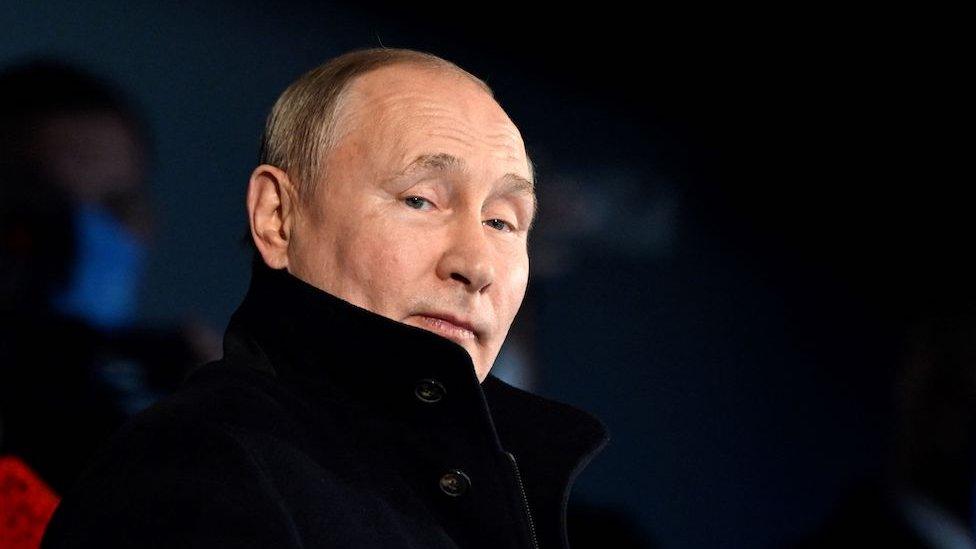Russia-Ukraine war: International court issues warrant for Putin's arrest
- Published

Judges at the International Criminal Court (ICC) have said that Russia's President, Vladimir Putin, should be arrested for war crimes.
The ICC was created to bring to justice those responsible for the worst crimes - such as crimes against humanity, and genocide which is where many people in a group are killed deliberately.
The arrest warrant follows a report by United Nations investigators, which said the way some Ukrainian children have been treated during the fighting was a war crime.
Russia denies committing war crimes and said the court's decisions have "no significance whatsoever".
But Ukrainian President Volodymyr Zelensky has called it a "historic decision, from which historical responsibility will begin".
US President Joe Biden has also welcomed the ICC's decision, and said committing war crimes in Ukraine is something the Russian leader had "clearly" done.
What is a war crime?
Ukraine: What are war crimes?
Even in war there are rules that aren't meant to be broken.
Over the last century, countries have agreed on rules about what you can and can't do in times of war.
There are international laws in place at times of war - breaking them is considered a war crime.
One of the rules is that ordinary people who aren't involved in fighting need to be protected.
Since the start of the war against Ukraine Russia has been accused of breaking those rules.
This, on the face of it, is an extraordinary development in Russia's year-old invasion of Ukraine.
What are President Putin and Russia's Commissioner for Children's Rights, Maria Lvova-Belova, accused of?
President Putin and the children's right's commissioner, Maria Lvova-Belova are both accused
Russia is accused of forcing groups of Ukrainian children to move to areas under its control.
United Nations investigators argued there was evidence of the transfer of hundreds of Ukrainian children to Russia.
In the report of their investigation, they gave examples of cases where parents or children told them that once in Russia-controlled areas, transferred children were made to wear "dirty clothes, were screamed at, and called names".
Their report says that some children with disabilities "did not receive adequate care and medication".
Russia is also accused of splitting families up and making it difficult for members to find each other again, with some children being adopted by Russian families even though they still have parents in Ukraine.
Investigators said that these actions break "international humanitarian law, and amount to a war crime".
The Court has called for the arrest of President Putin along with Russia's Commissioner for Children's Rights, Maria Lvova-Belova.
Ukraine's prosecutor general says the decision is "a signal that the Russian regime is criminal" and that this "is a historic decision for Ukraine and the entire system of international law."
Russia has repeatedly denied war crimes, during its invasion of Ukraine and says it does not recognise the jurisdiction of the International Criminal Court and doesn't have to do what it says.
What is the International Criminal Court?
Karim Ahmad Khan is the top prosecutor of the International Criminal Court
Based in the Hague in the Netherlands, the International Criminal Court (ICC) was created to bring to justice those responsible for the worst war crimes and usually only intervenes when countries cannot or will not prosecute themselves.
The court does not have its own police force, so it relies on other states to hand over suspects as well as respect its rulings.
The court is also only supported by certain countries, who signed up to a special agreement that set up the court, known as the Rome Statute.
Russia isn't one of those countries and so doesn't recognise the court and its rulings.
There are other rules that affect how people behave during wars - they're made up of treaties (which are agreements between countries) such as the Geneva Convention, as well as other international laws.
Protects the sick, wounded, medical and religious personnel during conflict
Care for the wounded, sick and shipwrecked during war at sea
Treat prisoners of war with humanity
Protect all civilians, including those in occupied territory
Will Putin be arrested because of the warrant?
It is highly unlikely that much will come of the move, as the ICC has no powers to arrest suspects without the co-operation of a country's government.
However, it could affect Mr Putin in other ways, such as being unable to travel abroad to visit some countries, and could now be arrested if he sets foot in any of the court's 123 member states, who work with the ICC.
It could also further impact on how he is seen both in his own country and abroad, as he is only the third serving president to have been issued with an ICC arrest warrant.
Sir Geoffrey Nice, a barrister and judge who has previously brought other people to trial for war crimes, said that although the warrant is "more of a symbolic move", this is an extremely valuable step by the ICC.
He said this is because it shows that there is enough evidence that Putin "is criminal, that the war is and has been criminal".
- Published26 February 2022
- Published22 February 2023
- Published1 March 2022
